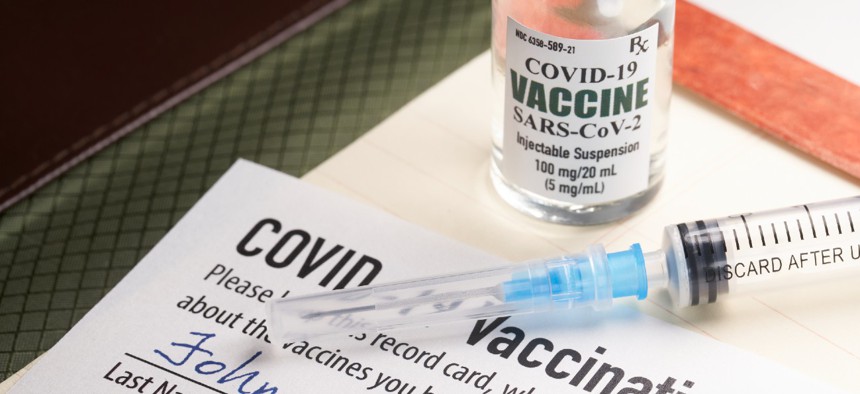Questions Linger on Vaccine Mandate for Federal Contractors

Bill Oxford / iStock.com
More guidance is expected to be released on September 24.
Contracting experts have additional questions about the vaccine mandate for federal contractors ahead of the supplemental guidance expected to be released later this month.
President Biden issued an executive order on September 9 requiring federal contractors, as well as federal employees, to be vaccinated against the novel coronavirus. The order outlines what should be implemented over the next month and how, but the Safer Federal Workforce Task Force will issue supplemental guidance by September 24 that will further explain the requirements and any exceptions.
“Notably, the contractor order does not mention vaccination;” however, “the White House’s announcement of the COVID-19 action plan, and the plan itself indicates that federal contractor employees will be subject to the same vaccination mandate applicable to federal employees,” wrote members of the law firm Vinson & Elkins LLP. The order “applies to new contracts or solicitations issued on or after October 15, 2021, as well as extensions or renewals of existing contracts, or exercises of options on existing contracts, that occur on or after October 15, 2021.”
Since there is this ramp-up period, the Biden administration’s Safer Federal Workforce Task Force said in an update on Monday that “prior to being contractually required to be vaccinated, onsite contractor employees who are not fully vaccinated and are not part of an agency testing program must provide proof of a negative COVID-19 test from no later than the previous three days prior to entry to federal building.”
In the meantime, experts have lingering questions.
“The text of the EO for federal contractors doesn’t clarify several scope and other definitional issues that are important to the contracting community,” Tom Gies, partner in the labor and employment group at the law firm Crowell & Moring, said in a statement to Government Executive. He said the following issues need to be clarified in the upcoming guidance:
- What does “performing on or in connection with” a federal government contract mean exactly?
- Will the term “workplace location” be interpreted “to cover everyone who may be working in a corporate campus/multiple building situation, where many of the employees do not work on government contracts?”
- To what extent will the mandates be applied to subcontractors and vendors of prime contractors?
- What are the specific enforcement and penalty details?
- “How will the task force, and the procurement agencies, interpret Section 2(d), which suggests that the EO will have no impact on any federal, state or local law establishing ‘more protective safety protocols’?”
- How will labor law obligations be handled?
“Litigation challenges to the implementation of the E.O. are already being discussed and are inevitable,” Gies said. “It’s difficult to predict the outcome of such challenges, but it is possible that injunction actions will delay full implementation.”
Members of the law firm McGuireWoods outlined in a post on Monday some of the questions they have about the White House’s slew of new coronavirus actions.
For federal contractors, “does the EO meet the basic implementing standard required under the Federal Property and Administrative Services Act...that the new requirements promote ‘economy’ and ‘efficiency’ in procurement?” they asked. Also, “will there be liability protections for employers who are forced to terminate employees for failure to comply with the federal vaccination or testing requirements?”
Guy Brenner, a partner at the law firm Proskauer Rose LLP who leads the labor and employment law practice and government contractor compliance group, told Government Executive “this isn’t an unusual tactic” as “the executive order is another example of a well-worn path that administrations follow when they have a policy initiative and they can’t necessarily get it through Congress, they impose requirements on government contractors.” This includes President Obama’s executive order on raising the minimum wage for contractors and President Trump’s order banning certain diversity training (which has been rescinded).
In the upcoming guidance Brenner said he is looking for a definition of “remote workers” because “indications from press briefings are that it will not apply to remote workers.” He also would like to know the parameters for the exceptions to the mandate.
Brenner pointed out that for “contractors based in Montana or any other state that passed such a law” banning vaccine mandates, “the employer is going to be in a difficult position.”
NEXT STORY: FCW Insider: September 15, 2021






